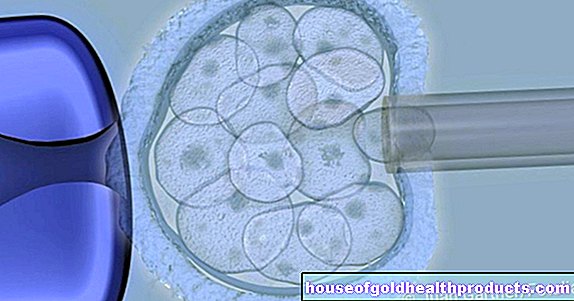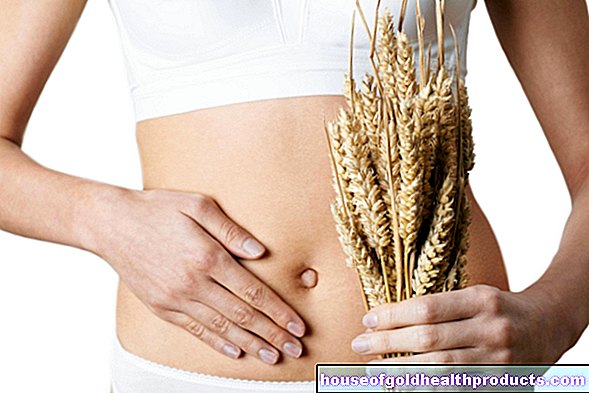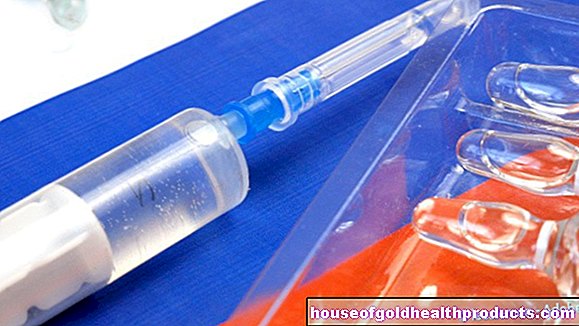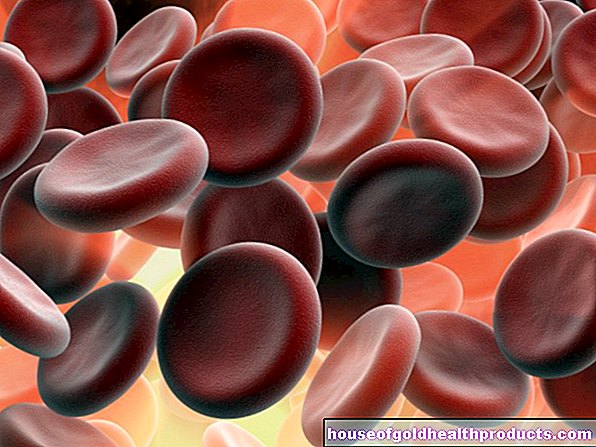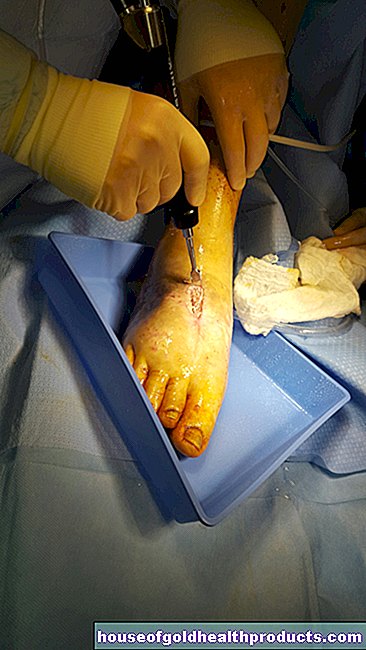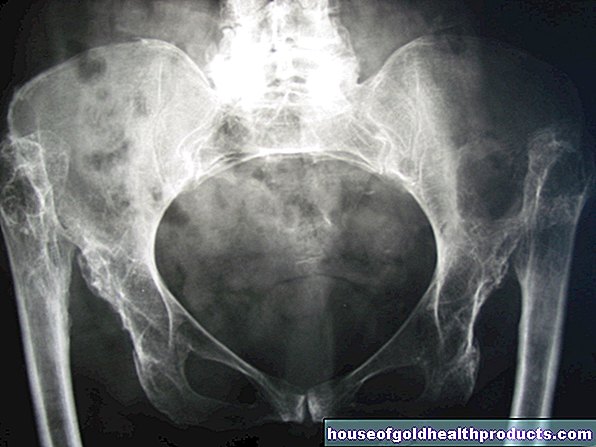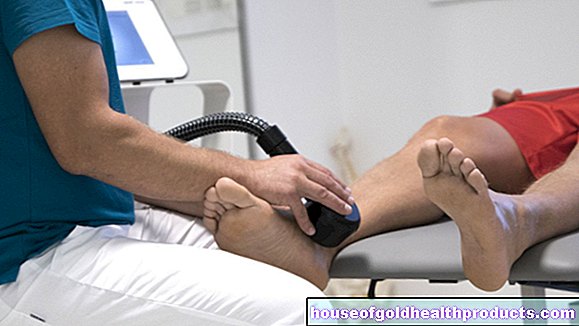Bowel disease
The spectrum of diseases that affect the intestine is broad: it ranges from mostly harmless food intolerance to acute intestinal infections and chronic inflammatory bowel diseases to life-threatening intestinal tumors. Read here how you can recognize an intestinal disease, what can be behind it and how it can be treated.
Inflammatory bowel disease
Under the generic term "chronic inflammatory bowel disease" (IBD), two forms are mainly summarized: Crohn's disease and ulcerative colitis. In both cases, the bowel becomes permanently inflamed. The patients mainly suffer from abdominal pain and diarrhea. Added to this are fatigue and weight loss, among other things.
In Crohn's disease, different parts of the entire digestive tract can be affected at the same time. For example, patients have damage to the mucous membrane in the mouth (aphthae), fistulas in the anus (anal fistula) and inflamed colon walls (over all layers of the wall).
Ulcerative colitis occurs almost exclusively in the rectum and large intestine. Here only the lining of the intestine becomes inflamed. With both chronic bowel diseases, other parts of the body can also become ill, such as the bile ducts, joints or eyes.
Both forms of the disease usually progress in flare-ups. What exactly triggers this is still unclear. The genome plays an important role. In ulcerative colitis in particular, researchers have discovered other risk factors, for example a high-fat diet or certain medications (e.g. contraception / hormone preparations).



Intestinal diseases from A to Z
A.- Amoebic dysentery
- Anal fistula
- Anal cancer
- Anal prolapse
- Schistosomiasis
- Appendicitis
- Ulcerative colitis
- Colon cancer
- Intestinal polyps
- Intestinal obstruction
- Diverticulitis
- Diverticulosis
- EHEC
- Roundworms
- Fructose intolerance
- Giardiasis
- Histamine intolerance
- hemorrhoids
- Lactose intolerance
- Food allergy
- Abdominal influenza
- Crohn's disease
- Hirschsprung's disease
- Norovirus
- Oxyuriasis
- Paralytic ileus
- Proctitis
- Irritable bowel syndrome
- Rectal cancer
- Dysentery disease
- Salmonella poisoning
- Roundworms
- Yersiniosis
- Celiac disease
Other intestinal diseases
In addition to chronic inflammatory bowel diseases, there are a number of other diseases that affect the intestine. These include acute inflammatory or malignant forms. Furthermore, those that can be traced back to vascular damage or are based on allergies and intolerances.
Acute inflammation of the bowel
Acute inflammation can affect the small or large intestine, individual sections or the entire intestine.
The "appendicitis" (appendicitis) is one of the most well-known intestinal diseases. It does not affect the appendix itself, but its appendix. Triggers are, for example, intestinal infections, foreign bodies such as fruit pits or hardened lumps of feces that obstruct the exit of the appendix on the appendix.
Duodenal ulcers are usually the result of an infection with the stomach germ Helicobacter pylori. But you can also train yourself through certain medications such as NSAID pain relievers, smoking, alcohol, and stress.
Diverticulitis: Small balloon-like protuberances - so-called diverticula - often form in the wall of the large intestine. If feces collect in it, the diverticula can become inflamed (diverticulitis). This happens particularly often in the last section of the large intestine, which leads to the rectum in an S-curve. There the pressure on the intestinal wall is particularly high.
Proctitis: In patients with proctitis, the last section of the rectum is inflamed - usually the anus as well. Problems with bowel movements, hip and groin pain are typical. Some sexually transmitted diseases are associated with such proctitis.
Pseudomembranous colitis: In pseudomembranous colitis, the colon becomes inflamed after antibiotic therapy. It brings the natural intestinal flora out of balance. This causes foul-smelling diarrhea, abdominal pain and fever.
Intestinal infections: Acute intestinal diseases are mostly caused by pathogens such as viruses, bacteria and parasites. Often the symptoms such as vomiting diarrhea are over after a few days. However, intestinal infections can also be life-threatening. This applies in particular to people with weakened immune systems and to infections with dangerous pathogens
Whipple's disease: In this very rare bacterial bowel disease, the pathogen Tropheryma whipplei damages the mucous membrane of the small intestine in particular. This makes it more difficult for the intestine to absorb some food components (malabsorption), which leads to an insufficient supply of the body. In addition to gastrointestinal complaints, severe weight loss is also typical. The infection also affects other organ systems - especially the joints, but also the heart, lungs, brain and eyes. If left untreated, the disease leads to death. It mainly affects white men between the ages of 30 and 60.



Colon cancer
Intestinal tumors are the second most common cancer in women and the third most common in men in Germany. Most of the cancer develops in the colon. The preliminary stages are usually benign intestinal polyps (adenomas). However, after some time, usually years, these can degenerate and grow viciously.
Colon cancer often develops slowly. There is therefore a good chance of detecting intestinal tumors and their preliminary stages in good time. As part of a colonoscopy, the doctor can not only detect colon polyps and colon tumors, he can often remove them without any problems.


Food intolerances and allergies
Medical professionals differentiate between food allergies and food intolerances. They are based on different disease mechanisms.
Food allergies: In the case of a food allergy, the body's immune system reacts to certain proteins (allergens) in food. In addition to gastrointestinal complaints, those affected can also develop skin rashes or shortness of breath. The reactions can be life-threatening. Therefore, severe allergy sufferers must always have an emergency kit with them.
Food intolerances: Food intolerances are much more common than allergies. They mainly cause abdominal pain, gas and diarrhea. These complaints have different causes.
- Lactose intolerance is based on a deficiency in the enzyme lactase, which actually breaks down milk sugar (lactose). If this step is missing, the bacteria in the intestine ferment the sugar, causing gas, diarrhea and cramps.
- Celiac disease describes an intolerance to the cereal adhesive gluten. Even small amounts of bread or pasta are enough to cause severe abdominal discomfort and inflammatory reactions. The cause has not yet been fully clarified.
- Fructose intolerance usually shows up because the intestine can only transport small amounts of fruit sugar (fructose) into the body. There is also an inherited form that is caused by an enzyme deficiency. The (excess) fructose is processed by bacteria in the large intestine. This creates gases and fatty acids that cause discomfort.
- Histamine intolerance affects people who are unable to sufficiently break down the inflammatory substance histamine. Foods that contain a lot of it then cause complaints.



Irritable bowel syndrome
Irritable bowel syndrome is a common symptom, the causes of which are not fully understood. Experts suspect, among other things, that the intestinal nervous system ("abdominal brain") is overactive in irritable bowel patients. Altered immune reactions or a disturbed intestinal wall barrier are further conceivable factors.
It is typical that doctors cannot find an organic cause that explains the extent of the symptoms. They make the diagnosis when they have ruled out other possible bowel diseases.


Radiation colitis
Radiation therapy as part of cancer treatment can have long-term effects on the intestine. The rays can damage the vessels that supply the intestines, among other things. The vessels become increasingly clogged and stiffen and can no longer supply the intestines with sufficient oxygen and nutrients. Sufferers typically have irregular bowel movements with diarrhea and constipation, as well as recurring bowel cramps.
Vascular and ischemic bowel disease
As is known from the coronary arteries, for example, blood vessels that supply the intestines can also “calcify”. The narrowed vessels make it difficult for blood to flow, so less oxygen reaches the intestinal wall. In the beginning, those affected have abdominal pain (angina abdominalis) primarily after eating. If the pathological processes progress, the pain persists. Add to this diarrhea and weight loss. In extreme cases, larger vessels close completely and an acute infarct occurs - an emergency.
Intestinal invagination
Intestinal invaginations mainly affect infants. Here, an upper section of the intestine slices telescopically into a section below. Sometimes the intestine slips back into its natural position on its own; a special enema often helps. If this is not the case, a life-threatening intestinal obstruction with severe abdominal pain can occur, which has to be operated on.

hemorrhoids
Hemorrhoids are vascular cushions that are arranged in a ring around the anus. Together with the sphincter muscle, they seal the intestinal outlet. If they enlarge, they begin to itch and bleed and sometimes turn inside out. In particular, people with chronic constipation who have to press hard when defecating suffer from it.


Bowel Disease: Symptoms
Whether an acute or chronic inflammation, an allergy, intolerance or autoimmune reaction - if the intestine is sick, the following symptoms typically occur:
- Abdominal pain (acute / chronic)
- Diarrhea, sometimes bloody or slimy
- Constipation (constipation)
- Alternating diarrhea and constipation
- Bloated stomach (meteorism)
- Excessive gas
Other possible symptoms of bowel disease are:
- Vomit
- Unintentional weight loss
- Exhaustion
- Joint pain
- inflammatory skin changes
Note:
With some intestinal diseases, however, symptoms appear late in the course of the disease. Colon cancer is one of them. Colon tumors are usually only detected in good time during a colonoscopy.



When do you have to see a doctor?
Gastrointestinal complaints can indicate a serious illness or even a medical emergency. You should be in the hands of a doctor in the following cases:
Call the emergency medical service if you experience gastrointestinal symptoms along with vomiting and a high fever, or if you notice blood in your vomit or stool.
If the abdomen hurts very much and becomes tight as a board, it is an acute abdomen - a case for the emergency doctor. It occurs, for example, with appendicitis, an intestinal obstruction or a ruptured bowel.
It is also best to have persistent gastrointestinal complaints clarified by a doctor as soon as possible, even if the symptoms are moderate.
Diarrhea and vomiting can be particularly dangerous for infants and young children. If the course is more severe or if the little ones seem limp and listless, you should consult a doctor.
Also consult a doctor if there are signs of dehydration. These include a dry mouth, thirst, small amounts of urine or dark urine, and skin folds that remain after being pulled up.
You should take blood in your stool seriously and have it checked by a doctor, even if there are no other symptoms. While the symptom can have many causes, one of them is colon cancer.



Complications of bowel disease
Various complications can arise in the course of an intestinal disease. The most important are:
- Bowel narrowing and obstruction (ileus) - The bowel can narrow or close due to colon tumors. The latter is a life threatening condition.
- Intestinal breakthrough: Due to inflammatory bowel disease or a tumor, the intestinal wall can be damaged so severely that intestinal contents "break through" to the abdominal cavity. Then there is danger to life.
- Peritonitis: So-called peritonitis can occur spontaneously or be the result of an intestinal disease. Then there are inflammatory or ischemic bowel diseases, an intestinal perforation or intestinal obstruction.
- Nutrient deficiency: The body absorbs too few nutrients (malabsorption), for example due to frequent diarrhea or changes in the mucous membrane of the small intestine. The consequences are symptoms of deficiency or severe weight loss.
- Electrolyte imbalances: Frequent diarrhea also disrupts the balance of important minerals such as potassium and sodium. This in turn can affect the heartbeat, for example.
- Toxic megacolon: The intestine expands as a result of life-threatening bowel inflammation. Acute severe abdominal pain occurs.
- Colon cancer: Chronic inflammation makes it easier for mutations to occur due to more frequent cell divisions. This increases the risk of colon cancer.

Bowel disease: causes
The causes of intestinal diseases are diverse. In the case of some clinical pictures, they are not fully understood. In these cases, experts assume that various factors come together, such as genetic predisposition and environmental influences such as smoking or medication. This is the case with inflammatory bowel diseases, among other things.
Pathogens: There are numerous pathogens that can affect the intestine: bacteria, viruses, fungi and parasites. The pathogens enter the body via droplet and smear infections, during sex, as part of a food infection or through contaminated drinking water.
- Bacteria produce toxins that trigger the discomfort.
- Viruses attack the body's cells in order to multiply and damage the tissue in the process. The defense reaction also causes symptoms of the disease.
- Single-cell parasites such as amoebas can damage the intestines or even invade the body. Among other things, they can cause severe ulcers.
- Different types of worms can also attack the intestines. These include, above all, roundworms such as roundworms, filariae and pinworms or flukes
- Fungi may play a special role in immune deficiency and after taking antibiotics. Much-discussed connections with complaints and other diseases such as irritable bowel syndrome or allergies have not (yet) been scientifically proven.


Microbiome: The various germs that naturally colonize the intestine form the intestinal microbiome (intestinal flora). They perform important tasks, for example in digestion and defense against pathogens. If it is out of balance, it promotes various intestinal diseases.
Deficiency or excess of digestive enzymes and juices: If the levels of digestive enzymes are too low, the food will not be digested properly. This causes a variety of problems, from insufficient supply to symptoms such as diarrhea and cramps. Too much bile or stomach acid can also cause problems.
Diet: How healthy the intestinal flora is also depends on the diet. For example, a high-sugar, low-fiber diet can disrupt the intestinal flora.
Radiation: Radiation therapy can damage the intestinal lining in the short term - but it can also cause long-term damage.
Immune system: The body's own defense system can also be involved in intestinal diseases. In the case of food allergies, but also celiac disease, misdirected defense reactions against certain food components cause complaints.
Genetic predisposition: Many diseases also have a genetic component. The disposition is inherited, the disease then breaks out under unfavorable circumstances. This also applies to various intestinal diseases - including ulcerative colitis, Crohn's disease, allergies, colon polyps and colon cancer.
Psyche: Psyche and gut are in constant exchange via the gut-brain axis. Stress and psychological stress therefore have a direct effect on digestion. They can therefore also influence the development and course of intestinal diseases.

Prevent intestinal diseases
Bowel diseases can be prevented. Diet plays a key role in this. Utilizing food, releasing nutrients and channeling them into the blood are among the main tasks of the intestine and its inhabitants.
An intestinal healthy diet includes
- Dietary fiber from whole grains, vegetables and fruits
- little sugar
- as little alcohol as possible
- hardly any red and processed meat (sausage, smoked meat, etc.)
- many natural, little industrially processed products (e.g. ready meals, fast food)
- sufficient fluids (water, unsweetened tea)
- Probiotic foods (fermented foods like sauerkraut, yogurt)
Exercise & relaxation
Exercise prevents intestinal diseases in at least two ways: On the one hand, physical activity supports bowel function. Those who do not move very much often also have a sluggish bowel.
On the other hand, exercise breaks down stress hormones. And stress has a direct and negative effect on the intestines. Accordingly, relaxation techniques such as autogenic training, progressive muscle relaxation or meditation also strengthen intestinal health.
Use antibiotics sparingly
Antibiotics are a boon in combating many diseases. But they make no distinction between "good" and disease-causing bacteria. Antibiotics therefore also intervene in the intestinal microbiome and disrupt its natural balance. They should therefore only be used in a targeted and sensible way.
Using colon cancer screening
Colon cancer is one of the few types of tumor in which preventive examinations can identify and remove not only malignant growths, but also their preliminary stages. Those who regularly attend the relevant appointments and also opt for a colonoscopy are very well protected against colon cancer.


Bowel disease: diagnosis
If you notice intestinal problems, your family doctor is a suitable first point of contact. He can question you in detail about your complaints and arrange initial examinations. If necessary, he will refer you to a specialist in bowel diseases, the gastroenterologist.
History: The basis of every diagnosis is a detailed discussion of the medical history. Doctors inform themselves about current and previous complaints as well as known previous illnesses. They also inquire about illnesses in the family to uncover a possible hereditary component.
Physical Exam: The medical history is followed by the physical exam. The doctor hears and feels, among other things, the stomach. Using typical noises, he can, for example, recognize an intestinal obstruction or narrow down the possible causes by using areas that are particularly painful to pressure.
Endoscopy ("mirroring"): Endoscopic examinations are an important diagnostic tool for many intestinal diseases. Ulcers, polyps and pathological changes in the intestinal mucosa can be identified. Depending on the section of intestine to be examined, the doctor inserts an endoscope either through the mouth (gastroscopy / gastroscopy) or through the anus (colonoscopy / colonoscopy).
Biopsy: If necessary, the doctor takes tissue samples (biopsies) from a mirror. These are examined in more detail in a pathological laboratory. This can be used to determine various intestinal diseases - for example celiac disease, Crohn's disease or colon cancer.
Blood test: The blood can also provide information about an intestinal disease. For example, it can be used to measure inflammation markers such as an increased number of white blood cells and C-reactive protein. Specific IgE antibodies in the blood indicate an allergy. Deficiency symptoms as a result of an intestinal disease such as a vitamin deficiency are also revealed on the basis of blood samples.
Stool sample: Pathogens and blood that indicate various diseases can be found in the stool. These include primarily intestinal infections and colon cancer. The doctor often also arranges for a stool exam to rule out certain bowel diseases.
Ultrasound examination: Using ultrasound of the abdomen, doctors can quickly and usually without great stress for the patient a first impression of various diseases. They can assess not only the intestines, but also the other abdominal organs such as the liver, gall bladder or pancreas. Ailments there can cause symptoms similar to those of an intestinal disease.
In some cases, doctors insert a small ultrasound probe through the anus. With the help of this so-called transrectal endosonography, the examiner examines, for example, the exact size of cancer in the rectum or rectum (anal carcinoma, rectal carcinoma) or of fistulas and abscesses.
Computed tomography and magnetic resonance imaging: If the doctor needs more precise images, he often arranges for an examination using computed tomography (CT) or magnetic resonance imaging (MRI, magnetic resonance imaging). The CT is faster and especially well suited in an emergency. MRI makes even better images, especially of "soft" tissue, but it takes longer. Intestinal sections that are difficult to access or inaccessible endoscopically can also be classified in this way.


Bowel Disease: Treatment
The treatment of intestinal diseases is just as diverse as the forms of the disease themselves. These include drugs, for example antibiotics against bacterial intestinal germs or cortisone for chronic inflammatory bowel diseases. In the case of acute intestinal inflammation, it is also important to compensate for the minerals and fluids lost through diarrhea.
In turn, some intestinal diseases require operations, for example if inflammatory fistulas form in the intestine. Doctors also treat colon cancer surgically, depending on the stage of the disease. Complications like an intestinal obstruction or a ruptured bowel also require surgical intervention
Often changed diets can alleviate intestinal diseases. Irritable bowel patients often benefit from a diet that is low in fermentable carbohydrates (low-FODMAP diet). In the case of allergies and intolerances, it is crucial to avoid the corresponding problematic substances.
Since the intestine and psyche are directly linked via the nervous system, relaxation techniques or psychotherapeutic procedures also have a positive effect on individual intestinal diseases in many cases.
You can read exactly how doctors treat a certain intestinal disease in the respective specialist articles.





.jpg)




